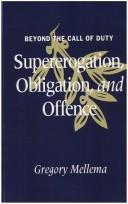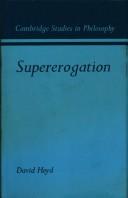| Listing 1 - 10 of 271 | << page >> |
Sort by
|
Book
ISBN: 9819936330 9819936322 Year: 2023 Publisher: Singapore : Springer Nature Singapore Pte Ltd.,
Abstract | Keywords | Export | Availability | Bookmark
 Loading...
Loading...Choose an application
- Reference Manager
- EndNote
- RefWorks (Direct export to RefWorks)

ISBN: 0791407373 0791407381 Year: 1991 Publisher: Albany : State University of New York Press,
Abstract | Keywords | Export | Availability | Bookmark
 Loading...
Loading...Choose an application
- Reference Manager
- EndNote
- RefWorks (Direct export to RefWorks)
Book
ISBN: 3110896613 Year: 2013 Publisher: Berlin ; Boston : De Gruyter,
Abstract | Keywords | Export | Availability | Bookmark
 Loading...
Loading...Choose an application
- Reference Manager
- EndNote
- RefWorks (Direct export to RefWorks)
Handlungen, mit denen wir mehr Gutes tun, als unsere Pflicht ist, heißen in der Ethik supererogatorisch. Die Autorin steckt einen Rahmen für Theorien der Supererogation ab. In jenem Rahmen dokumentiert sie die Geschichte dieses Begriffes und würdigt aktuelle Theorien - um deren Beschränkungen zu überwinden. Auch wenn wir über das Gebotene hinausgehen, so ihre These, können wir fehlen; wir können uns neue Pflichten einhandeln.

ISBN: 0521239354 9780521239356 Year: 1982 Publisher: Cambridge Cambridge University press
Abstract | Keywords | Export | Availability | Bookmark
 Loading...
Loading...Choose an application
- Reference Manager
- EndNote
- RefWorks (Direct export to RefWorks)
Supererogation --- Duty --- Responsibility

ISBN: 3110174901 Year: 2002 Publisher: Berlin de Gruyter
Abstract | Keywords | Export | Availability | Bookmark
 Loading...
Loading...Choose an application
- Reference Manager
- EndNote
- RefWorks (Direct export to RefWorks)
Supererogation --- General ethics --- Duty --- Responsibility
Book
ISBN: 1282233122 9786613810861 0889206163 9780889206168 Year: 1992 Publisher: Waterloo, Ont., Canada : Published for the Canadian Corporation for Studies in Religion/Corporation Canadienne des Sciences Religieuses by Wilfrid Laurier University Press,
Abstract | Keywords | Export | Availability | Bookmark
 Loading...
Loading...Choose an application
- Reference Manager
- EndNote
- RefWorks (Direct export to RefWorks)
Sharing without Reckoning is the first full-scale treatment of the ancient and persistent distinction between ""perfect"" and ""imperfect"" rights and duties. It examines the use of the distinction in jurisprudential, philosophical and religious material from Classical times until the present; proposes a connection between imperfect right and the ""norms of reciprocity"" (as that complex set of ideas has been developed in anthropology and sociology); and argues that contemporary understanding of the nature of morality and of moral reasoning would be well served by the reintroduction
Duty. --- Supererogation. --- Abuse of rights.

ISBN: 0889202087 Year: 1992 Publisher: Waterloo Wilfrid Laurier university press
Abstract | Keywords | Export | Availability | Bookmark
 Loading...
Loading...Choose an application
- Reference Manager
- EndNote
- RefWorks (Direct export to RefWorks)
Abuse of rights --- Duty --- Supererogation
Book
ISBN: 1640951059 9781640951051 9781640951044 Year: 2019 Publisher: Sound Wisdom
Abstract | Keywords | Export | Availability | Bookmark
 Loading...
Loading...Choose an application
- Reference Manager
- EndNote
- RefWorks (Direct export to RefWorks)
"In order to create a truly meaningful life, we must first accept that the problem is never other people. "The real problem," Sam Silverstein maintains, "is what we believe about other people." Silverstein's new book shows why everything we have been taught about accountability is wrong. Contrary to popular belief, accountability is not a way of doing. Accountability is a way of thinking. It is how we think about ourselves and others. And it is the highest form of leadership. The secret to creating accountable relationships, and elevating the personal benchmark that Silverstein calls the The Accountability Index, lies in making ten critical choices that support an accountable mindset. I Am Accountable offers a comprehensive plan to help you establish and leverage that mindset, deepen commitments, create lasting meaning in your life and relationships, transform the culture within your organization, and foster positive change in the larger community"--
Responsibility. --- Accountability --- Moral responsibility --- Obligation --- Ethics --- Supererogation
Book
ISBN: 2753504784 9782753504783 Year: 2007 Publisher: Rennes : Presses universitaires de Rennes,
Abstract | Keywords | Export | Availability | Bookmark
 Loading...
Loading...Choose an application
- Reference Manager
- EndNote
- RefWorks (Direct export to RefWorks)
Un individu en sauve plusieurs autres, inconnus de lui, au péril de sa vie, dans des circonstances difficiles, alors qu'il n'était tenu par aucune mission ou aucune fonction de le faire. Pour l'opinion commune, voilà qui est héroïque. Objets de fascination, les personnes moralement " héroïques " ou " saintes " sont nommées ainsi parce qu'elles ont accompli des actes exceptionnels, au-delà de tout devoir moral, des actes " surérogatoires ". Mais peut-on vraiment aller au-delà de l'obligation morale? Interrogé sur son acte, notre héros dit simplement: " Je n'ai fait que mon devoir. " Formule d'humilité, peut-être. Pourtant ne dirait-il pas la vérité? On a peut-être trop vite fait de donner des limites au devoir, comme un prétexte pour ne pas agir, en bien des circonstances. Cependant si le devoir est sans limite, l'exigence morale ne sera-t-elle pas excessive, insupportable? Les philosophes se disputent sur ce sujet. Il y a là une zone trouble de l'éthique, dont ce livre explore les paradoxes, en étudiant les débats contemporains sur les limites du devoir, et leurs répercussions sur notre vie éthique la plus ordinaire.
Supererogation --- Duty --- Moral development --- Surérogation. --- Devoir.
Book
ISBN: 9789264078680 Year: 1999 Publisher: Paris : OECD Publishing,
Abstract | Keywords | Export | Availability | Bookmark
 Loading...
Loading...Choose an application
- Reference Manager
- EndNote
- RefWorks (Direct export to RefWorks)
This document defines the roles and responsibilities of the Study Director in Good Laboratory Practice studies.
Duty --- Responsibility --- Accountability --- Moral responsibility --- Obligation --- Ethics --- Supererogation --- Deontology
| Listing 1 - 10 of 271 | << page >> |
Sort by
|

 Search
Search Feedback
Feedback About UniCat
About UniCat  Help
Help News
News